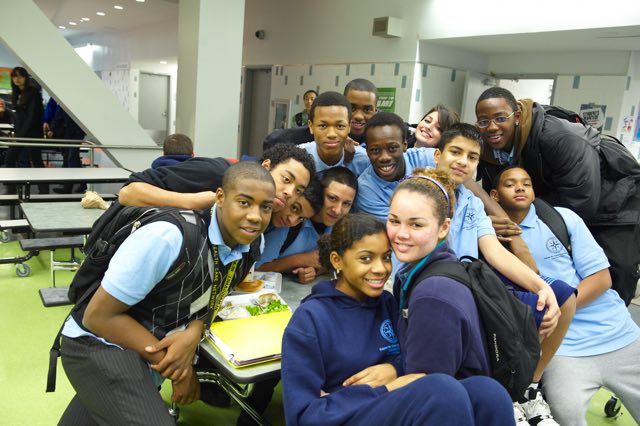What is Project-Based Learning?
Project-Based Learning is a teaching method in which students gain knowledge and skills by working for an extended period of time to investigate and respond to a culturally relevant, authentic, engaging, and complex question, problem, or challenge. Project-Based Learning includes opportunities for students to grapple with and challenge systems of inequity and propose solutions for change.
In a project-based unit, students are engaged in solving a real-world problem that includes a motivating kickoff experience, relevant and inspiring guiding questions, meaningful fieldwork, and a culminating event where students share their projects with an authentic audience. During these presentations of learning, students apply their learning rather than just restate their work — particularly when presentations are grounded in service, social activism or advocacy.
Project-based units run from two weeks to a semester. All projects explicitly focus on building literacy skills, particularly in reading and writing nonfiction text and writing from evidence.
How Do we Support Project-Based Learning in Schools?
We support project-based learning through a series of professional learning workshops and direct teacher and team coaching. Schools choose from one or more project-based learning strands which are customized to meet the individual goals of each school.
Our staff work with leadership and teachers to help them implement specific project-based learning practices that prepare students to create meaningful, authentic, standards-aligned projects. We encourage teacher teams to work together to plan curriculum, share knowledge, test tools and brainstorm solutions to ensure equity of voice.

Sample Teacher Learning Targets
- I can design a unit or curriculum that promotes deep learning and engagement and brings the state learning standards to life.
- I can design a product rich in authenticity and complexity that will require students to read for and write with evidence.
- I can identify strategies for creating a respectful and supportive culture for critique and feedback.
- I can determine how to support students in sharing their learning with an authentic audience.
- I can design daily lessons that put students at the center of their own learning.
Offerings Include
- A needs assessment, including a learning walk and curriculum review
- A “Project-Based Learning 101” professional development sequence to introduce the concept and purpose of project-based learning and the selected focus areas to all staff
- “Core Learning Experiences,” including professional learning workshops around one or more Project-based Learning Strands, individual and group coaching sessions, classroom observations, and leadership meetings
- A half day of staff team building activities
- Half-day planning session for an end-of-year celebration of learning
5 Ways PBL Leads to More Equitable & Engaged Classrooms
Project-based learning is the tool that NYC Outward Bound Schools educators leaned on during virtual learning. Now, as we return to in-person learning, PBL can help create more equitable and engaged classrooms of students.
Project-Based Learning Strands
Designing Project-Based Learning Units and Curricula
- Creating challenging case studies and learning expeditions
- Choosing compelling topics and creating guiding questions
- Backward planning using standards, targets and assessments
Lessons that Support Project-Based Learning
- Creating daily lessons to engage and support students
- Using protocols to create a student-centered classroom
- Designing lessons that allow students to give each other meaningful feedback
Scaffolding for High-Quality Work
- Providing opportunities for students to engage with authentic audiences during final product presentations
- Creating rubrics that support purposeful student learning
- Designing units that result in actionable work-products and empowering students to take action
For more information about implementing Project-Based Learning as a Select Strategy, fill out this form or contact Badari Ambatti, Director of Client Relations at [email protected] or (718) 706-9900 x 125.
See Our Other Shared Practices:
Select Strategy: Crew
Crews focus on building essential social-emotional and academic skills through a combination of team building, student-centered academic support, conflict resolution and adventure. Learn more.
Select Strategy: Student-Engaged Assessment
Student-engaged assessment is a strategy that helps students understand and take ownership of their own growth as learners. Learn more.
Outdoor Adventure
We offer safe, fun and engaging Outdoor Adventure programming to students and educators. These programs range from one-day community-building workshops in city parks to multi-day adventures at our basecamp in Fishkill, NY. Learn more.




